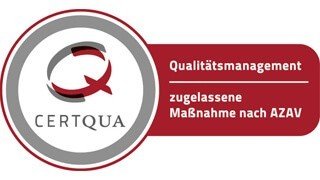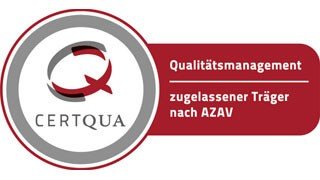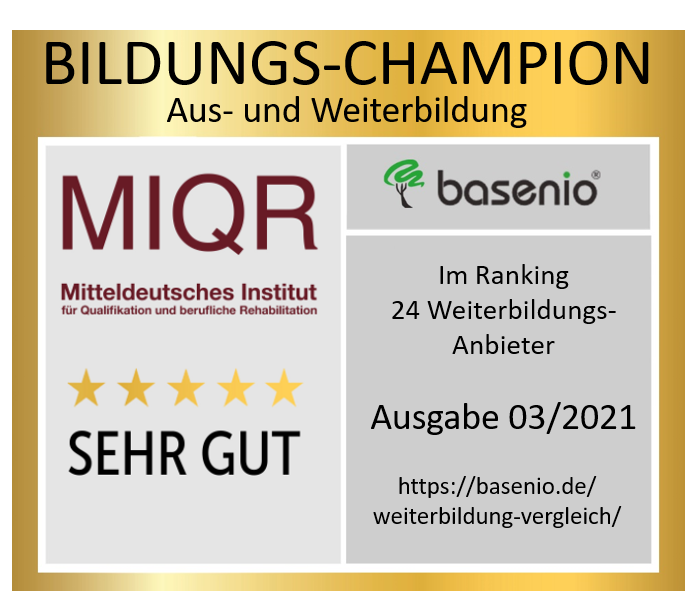Qualification Opportunities Act | WeGebAU | Employment Agency | Continuing education
Qualification Opportunities Act (WeGebAU) of the Employment Agency
There are constant innovations in the field of funding, so that it is easy to lose track. That is why we from the Central German Institute for Qualification and Vocational Rehabilitation (MIQR) happy to explain what's under that Qualification Opportunities Act is to be understood and which further training can be promoted with it.
What is the Qualification Opportunities Act?
As part of the further training offensive on January 01st, 2019 Qualification Opportunities Act adopted. This means that the "further training of low-skilled and employed older workers in companies" (WeGebAU) replaced or expanded. The Qualification Opportunities Act is intended to create more opportunities for employers to have employees promote further training. The target group has been expanded. A total of three different subject areas were changed with the introduction of the Qualification Opportunities Act.
These changes in the course of funding are anchored in the Third Social Code. There you can also read what rights you have as an employee or employer with the introduction of the Qualification Opportunities Act obtain. Basically it was stated there:
“The funding should be aimed at giving employees who carry out professional activities that technologies can be replaced or are otherwise affected by structural change, to enable them to adapt and develop their professional skills in order to be able to better meet the challenges mentioned. The same applies to employees who are looking for further training in a bottleneck.”
This shows that funding is now also being considered that relates to further training, which is necessary due to digital change. This is intended to react to current changes and to adapt the labor market today to tomorrow.
Training for employees
With the developments of Work 4.0 the topic of digitization is becoming increasingly important. This also increases the need for further training. This is the only way employees can protect their work in the long term. For this reason, the Qualification Opportunities Act is not only aimed at low-skilled and older employees, but also at employees whose professional activity could be jeopardized by the emerging digitization. With the help of the Qualification Opportunities Act, they are given the opportunity to continue their education and thus develop skills that are absolutely necessary in the age of digitization.
Requirements for unemployment benefit
With the introduction of the Qualification Opportunities Act, the conditions for receiving unemployment benefits are also to be changed. It remains that at least 12 months had to pursue an activity subject to social security contributions for a long time. However, a period of 24 months is not taken into account, but of 30 months. With the help of this extension of the observation period, access to unemployment benefits should be made easier.
Better Advice
In order to provide better advice on further training opportunities and qualifications, the Federal Employment Agency is to be expanded into the Federal Employment and Qualification Agency. This is only possible due to the high reserves of the Employment Agency. For this reason, the social security contribution for the Employment promotion reduced to currently 2,5% will. In this way, employees and employers should be relieved.
Qualification Opportunities Act & WeGebAU
The WeGebAU became Qualification Opportunities Act superseded. This results in the following innovations:
- As already explained, the Target group for funding extended, so that more employees can receive subsidies under certain conditions. This will make further training accessible to more employees.
- In addition, with the Qualification Opportunities Act right to advice established: Every employee has the right to be advised about further training and its promotion.
The In terms of content, the Qualification Opportunities Act sees itself as an extension of the WeGebAU, which is now intended to appeal to more employees in order to be able to react to the rapid digitization of the labor market.
Further training at the MIQR
Also at the Central German Institute for Qualification and Vocational Rehabilitation (MIQR) you can complete further training and retraining that is funded by the Qualification Opportunities Act. The following Retraining with IHK qualification you can choose from:
- Clerk for office management (KBM)
- Industrial clerk (IK)
- Clerk in health care (KiG)
- Merchant in e-commerce (K E Com)
- Clerk for wholesale and foreign trade management (Kga)
Around Further training and labor market integration you can choose from a wide range of offers. Among other things, we offer you further training to become a specialist in e-commerce/online trade (E Com) or the IHK specialist trading on the internet on. You can also choose from further training in the areas of care, storage and logistics, housekeeping, as well as security.

World of work 4.0 - New opportunities for qualification in the MIQR
Further training with the Qualification Opportunities Act
Before the Qualification Opportunities Act was enacted, only adjustment qualifications were funded. This is now to be changed. With the Qualification Opportunities Act Further developments promoted, which enable additional qualifications. In this way, employees can be permanently prepared for developments on the labor market. It is no longer about a short-term adjustment to the current work situation, but about the opportunity to look to the future in the long term. With further training and the acquisition of an additional qualification, employees can practice their profession for longer.
Funding from the Employment Agency
The further training courses included in the Qualification Opportunities Act are managed by the Federal agency for work promoted. This results in new funding opportunities for employees.
Before January 01, 2019, it was hardly possible to receive funding for external training. But that changed with the Qualification Opportunities Act. Well can Employees regardless of age or company size hope to receive grants for further education.
Conditions for funding
Basically it is importantthat further training serves employees whose professional activity could be replaced due to digitization. In addition, low-skilled and older employees will continue to be supported, as well as people who want to do further training in an occupational field that has a shortage of skilled workers. However, only further training courses are funded whose meaningfulness is evident. This means that this must pursue the goal of maintaining the professional activity. These are further training courses that are not solely job-related or only ensure short-term adjustment to changing requirements. The further training must long-term affect. In order for the grant to be approved, a Further Training from more than 160 hours be aimed at. The qualification measure may be implemented flexibly. This refers, for example, to the training times. It doesn't matter whether the training is full-time, part-time or part-time. It is important to note that the training is not carried out by the company itself. Instead, one must external educational institution be responsible for it. Besides, may No further training within the last 4 years have been completed, which is designated as eligible for funding by the Qualification Opportunities Act.
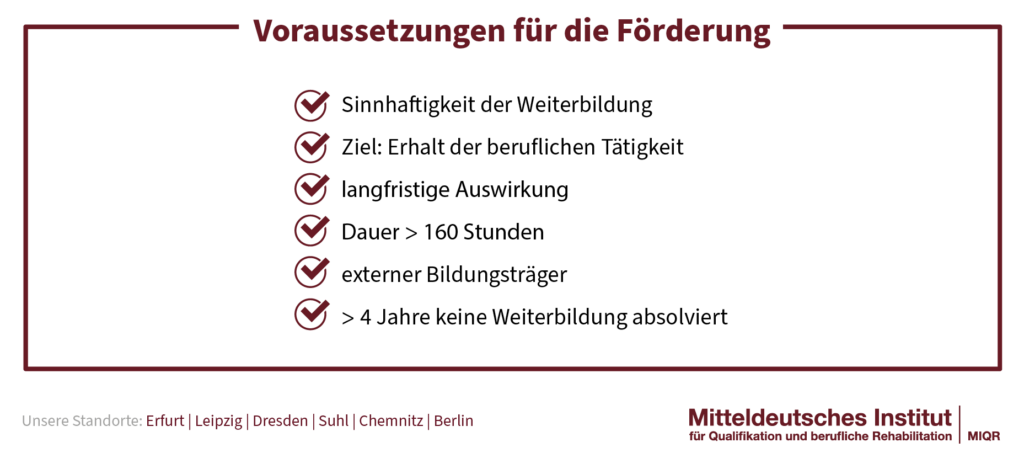
How is funding supported?
Within the Funding through the Qualification Opportunities Act, it is a financial support. Here the training costs carried. The amount of the subsidy depends on the size of the company in which the employee is employed. Also, there is one wage subsidy, which also varies as a percentage depending on the size of the hiring company. This is intended to compensate for the loss of manpower during the training period.
amount of funding
Depending on the size of the company, head tiered. Certain exceptions apply here, which also allow larger companies to receive higher funding.
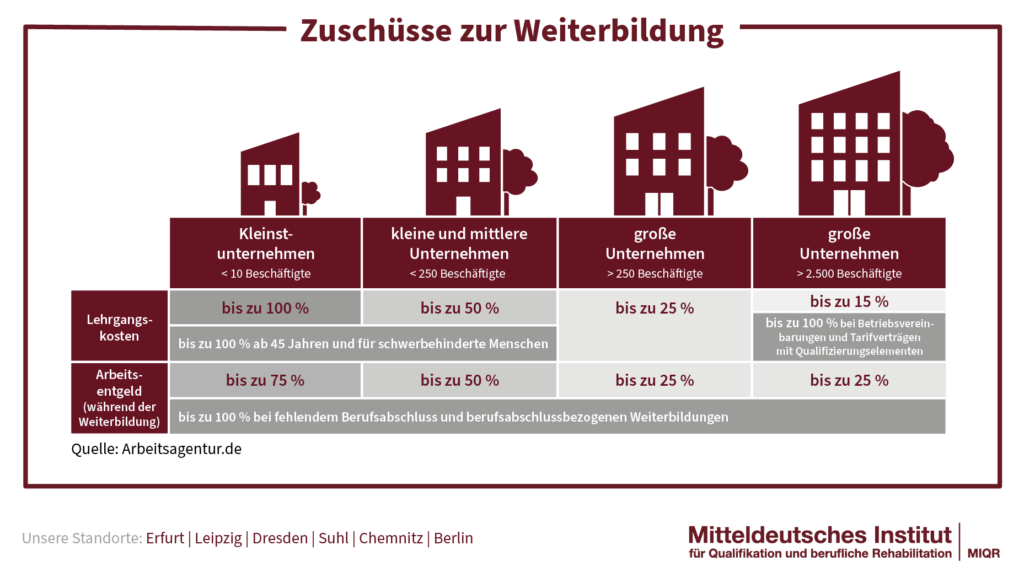
Im Social code it is stated that the type of support refers to financial support. It is important to note that the employer must be involved, which is adjusted to the size of the company. Then it is decided how high the subsidy for the further training costs and the wages will be.
For Micro businesses with fewer than 10 employees, up to 100% of the training costs are covered by the employment agency. The employment agency pays up to 75% of the salary during further training.
The small and medium-sized companies with fewer than 250 employees, up to 50% of the course costs are covered. An exception applies here if the sponsored employees are over 45 years of age or severely disabled. Then the costs of further training can be borne up to 100% by the Employment Agency. The salary is subsidized by up to 50%.
The larger companies with more than 250 employees, there is funding for further training of up to 25% of the costs incurred. Up to a quarter of the salary can also be taken over.
The big companies with more than 2.500 employees, up to 15% of the course costs are borne by the employment agency. There is an exception if there are company agreements and collective agreements with qualification elements. Then up to 20% of the training costs can be funded. The salary during further training is subsidized by up to 25%.
For all company sizes There is one exception: for employees without a professional qualification and job-related further training, up to 100% of the wages are paid by the employment agency.
How is the Qualification Opportunities Act applied for?
In order for further training to be completed, the Employer and the employment agency agree to this measure. Currently there is no fixed right to further training. This means that employers do not have to agree to a request for further training from the employee. This is due to the fact that only partial funding is provided for further training. As a result, the employer must pay a proportionate share of the course costs. Since this is a financial burden, it is up to the employer to decide whether he or she is willing to partially finance further training.
However, if the employer agrees that further training can be completed, the Employment Agency decide how high the funding can be and whether the selected measure is even eligible for funding. For this, the above conditions must be met. Of course, meeting the requirements listed is no guarantee that the application for further training funding will be approved under the Qualification Opportunities Act. You should therefore obtain information on site from the responsible employment agency. There is also the telephone for this employer service under the free hotline of the Employment Agency: 0800 4 5555 20.
Useful information for employers
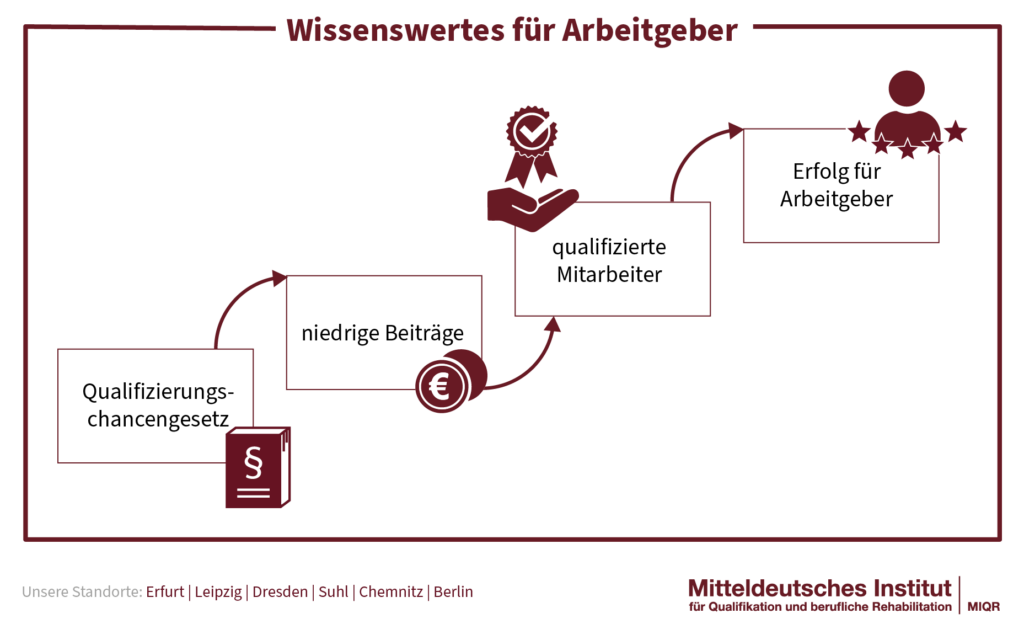
Also as Employer benefit from the reduction in the contribution rate for employment promotion from 3,0% to 2,5%. Since the contribution to employment promotion is paid half by the employee and half by the employer, you now pay 0,25 percentage points less into unemployment insurance.
Employers should also be aware that further training does not have to be approved. Depending on the company, a loss of work due to employee training can have a negative impact on operations. However, it is important to remember that a Further training beneficial for the employees is. Because only with further training can employers be sure that the workforce is up to date with the latest knowledge. In this way, the qualifications of the employees can be maintained.
Criticism of the Qualification Opportunities Act
Despite the new Funding Opportunities there is criticism of the Qualification Opportunities Act. Although there is a right to advice on further training and funding, it is criticized that no right to further training in the direct sense has been issued. Employers are not obliged to support their employees through further training and to further qualify them.
In addition, critical voices are raised in relation to the reduction in the contribution rate for employment promotion. Because this counteracts the further training offensive. If the contribution rates are lower, fewer further training courses can be subsidized in the long run.
Conclusion
Here you have now learned that the Qualification Opportunities Act offers you as an employee the opportunity to complete further training and - under various conditions - to be subsidized. We would be happy to accompany you on this path and help you with further training MIQR to new qualifications.
If you found this post interesting and would like to be kept up to date on all events, then give a "I like it“ for the official MIQR Facebook page. 👍
If you have any questions about our offer or would like personal and individual advice, please send us an inquiry.





